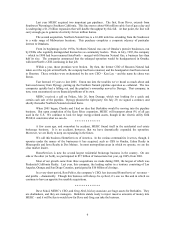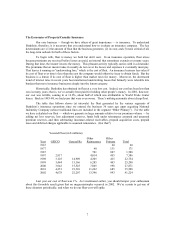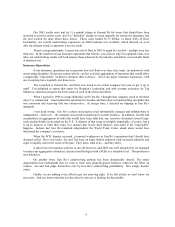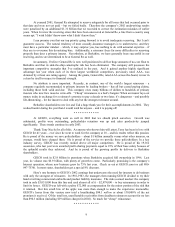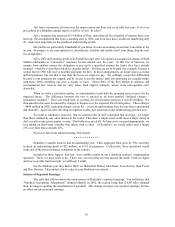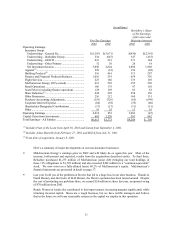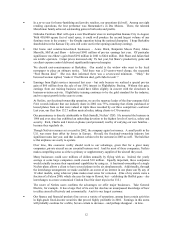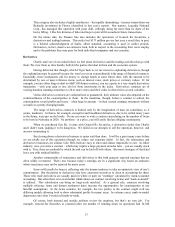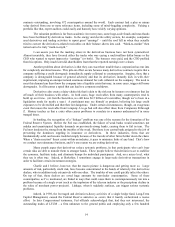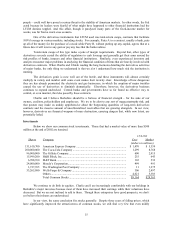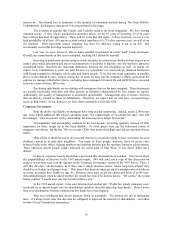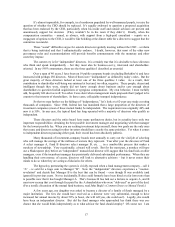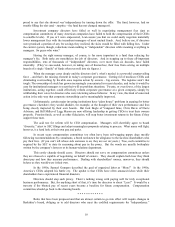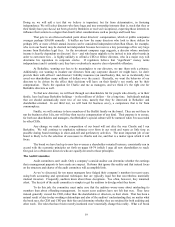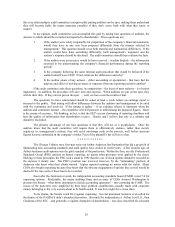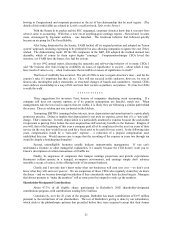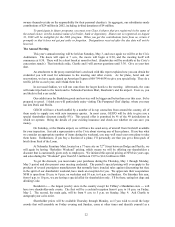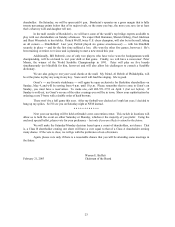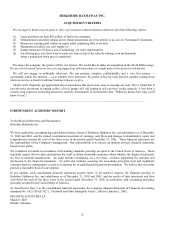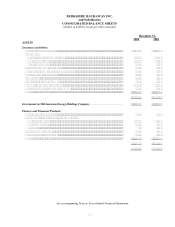Berkshire Hathaway 2002 Annual Report Download - page 17
Download and view the complete annual report
Please find page 17 of the 2002 Berkshire Hathaway annual report below. You can navigate through the pages in the report by either clicking on the pages listed below, or by using the keyword search tool below to find specific information within the annual report.16
interest us. That dismal fact is testimony to the insanity of valuations reached during The Great Bubble.
Unfortunately, the hangover may prove to be proportional to the binge.
The aversion to equities that Charlie and I exhibit today is far from congenital. We love owning
common stocks – if they can be purchased at attractive prices. In my 61 years of investing, 50 or so years
have offered that kind of opportunity. There will be years like that again. Unless, however, we see a very
high probability of at least 10% pre-tax returns (which translate to 6½-7% after corporate tax), we will sit on
the sidelines. With short-term money returning less than 1% after-tax, sitting it out is no fun. But
occasionally successful investing requires inactivity.
Last year we were, however, able to make sensible investments in a few “junk” bonds and loans.
Overall, our commitments in this sector sextupled, reaching $8.3 billion by yearend.
Investing in junk bonds and investing in stocks are alike in certain ways: Both activities require us to
make a price-value calculation and also to scan hundreds of securities to find the very few that have attractive
reward/risk ratios. But there are important differences between the two disciplines as well. In stocks, we
expect every commitment to work out well because we concentrate on conservatively financed businesses
with strong competitive strengths, run by able and honest people. If we buy into these companies at sensible
prices, losses should be rare. Indeed, during the 38 years we have run the company’ s affairs, gains from the
equities we manage at Berkshire (that is, excluding those managed at General Re and GEICO) have exceeded
losses by a ratio of about 100 to one.
Purchasing junk bonds, we are dealing with enterprises that are far more marginal. These businesses
are usually overloaded with debt and often operate in industries characterized by low returns on capital.
Additionally, the quality of management is sometimes questionable. Management may even have interests
that are directly counter to those of debtholders. Therefore, we expect that we will have occasional large
losses in junk issues. So far, however, we have done reasonably well in this field.
Corporate Governance
Both the ability and fidelity of managers have long needed monitoring. Indeed, nearly 2,000 years
ago, Jesus Christ addressed this subject, speaking (Luke 16:2) approvingly of “a certain rich man” who told
his manager, “Give an account of thy stewardship; for thou mayest no longer be steward.”
Accountability and stewardship withered in the last decade, becoming qualities deemed of little
importance by those caught up in the Great Bubble. As stock prices went up, the behavioral norms of
managers went down. By the late ’ 90s, as a result, CEOs who traveled the high road did not encounter heavy
traffic.
Most CEOs, it should be noted, are men and women you would be happy to have as trustees for your
children’ s assets or as next-door neighbors. Too many of these people, however, have in recent years
behaved badly at the office, fudging numbers and drawing obscene pay for mediocre business achievements.
These otherwise decent people simply followed the career path of Mae West: “I was Snow White but I
drifted.”
In theory, corporate boards should have prevented this deterioration of conduct. I last wrote about
the responsibilities of directors in the 1993 annual report. (We will send you a copy of this discussion on
request, or you may read it on the Internet in the Corporate Governance section of the 1993 letter.) There, I
said that directors “should behave as if there was a single absentee owner, whose long-term interest they
should try to further in all proper ways.” This means that directors must get rid of a manager who is mediocre
or worse, no matter how likable he may be. Directors must react as did the chorus-girl bride of an 85-year-
old multimillionaire when he asked whether she would love him if he lost his money. “Of course,” the young
beauty replied, “I would miss you, but I would still love you.”
In the 1993 annual report, I also said directors had another job: “If able but greedy managers over-
reach and try to dip too deeply into the shareholders’ pockets, directors must slap their hands.” Since I wrote
that, over-reaching has become common but few hands have been slapped.
Why have intelligent and decent directors failed so miserably? The answer lies not in inadequate
laws – it’ s always been clear that directors are obligated to represent the interests of shareholders – but rather
in what I’ d call “boardroom atmosphere.”


